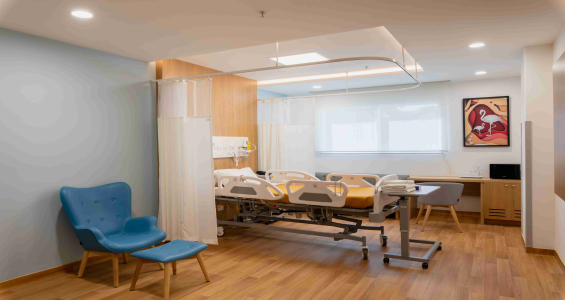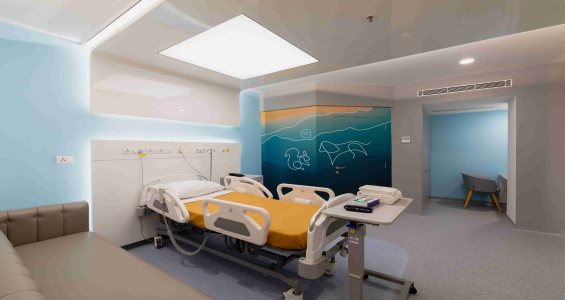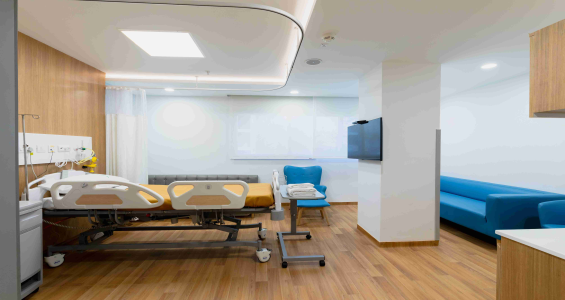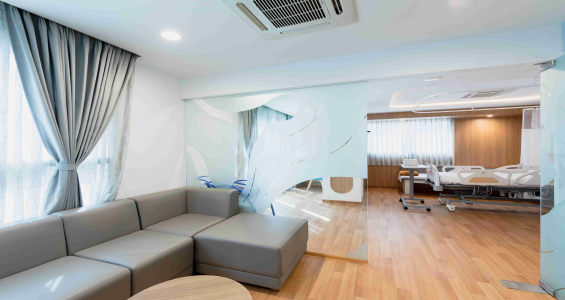Pregnancy and childbirth is possibly the most important time of a woman's life. At Aster Women and Children Hospital, Whitefield; we believe that during this time, a woman deserves excellent maternity care, we offer tailor-made services for moms-to-be. You can get all the services for you and your baby under one roof. Right from fertility to maternity care and delivery to paediatric care, we got you covered!
The Department includes Obstetricians, Lactation experts, fetal medicine experts, nutritionists, physiotherapists, and trained and experienced nursing staff.
BOOK YOUR DELIVERY PACKAGE NOW
To make your journey more valuable, book your Delivery Package now and avail following complimentary services:
Inclusions for Mom-to-be
Complimentary first scan
10% off on Lab inclusions
Nutrition Consultation
Pre-Natal Exercise
Lamaze/ Labor Preparation session
Parental Education
Lactation Consultation
Emergency pick-up and drop services.
Inclusions for New Born
Consultation with Neonatologist
New Born Screening Test (to evaluate any birth deformities)
Goodies for New born
Room and Car decor welcoming the new born
Baby photoshoot by a professional with complimentary 1 print copy.
Pregnancy and childbirth is possibly the most important time of a woman's life. At Aster Women and Children Hospital, Whitefield; we believe that during this time, a woman deserves excellent maternity care, we offer tailor-made services for moms-to-be. You can get all the services for you and your baby under one roof. Right from fertility to maternity care and delivery to paediatric care, we got you covered!
The Department includes Obstetricians, Lactation experts, fetal medicine experts, nutritionists, physiotherapists, and trained and experienced nursing staff.
BOOK YOUR DELIVERY PACKAGE NOW
To make your journey more valuable, book your Delivery Package now and avail following complimentary services:
Inclusions for Mom-to-be
Complimentary first scan
10% off on Lab inclusions
Nutrition Consultation
Pre-Natal Exercise
Lamaze/ Labor Preparation session
Parental Education
Lactation Consultation
Emergency pick-up and drop services.
Inclusions for New Born
Consultation with Neonatologist
New Born Screening Test (to evaluate any birth deformities)
Goodies for New born
Room and Car decor welcoming the new born
Baby photoshoot by a professional with complimentary 1 print copy.

Deluxe Room
Some additional comforts in this more spacious room include a TV, refrigerator and microwave. Besides the ensuite washroom, your companion has a couch and you have a feeding chair for you and your newborn.
Single Room (Basic Room Category)
Each single room comes with a washroom attached. To make your family comfortable, we also provide a TV and an attendant couch.


Signature Room
To give a mother what she deserves, we have gone out of our way to include the comforts of your own home. Besides a washroom, attendant sofa, TV, refrigerator and microwave, we also provide a personal pantry. Enjoy food of your choice while you relax in your feeding chair with your beautiful baby.
Suit Rooms
Some additional comforts in this more spacious room include a TV, refrigerator and microwave. Besides the ensuite washroom, your companion has a couch and you have a feeding chair for you and your newborn.

We have some of the best specialty doctors from around the world, they bring years of experience and offer evidence-based treatment to ensure the best care for you.


There are several signs and symptoms that indicate pregnancy. These include -
- Missed Period - If you are of childbearing age and a week or more has passed with you having a period then you may be pregnant. However, this is also a misleading symptom as a delay in the period can also be caused due to an irregular menstrual cycle.
- Tender Nipples and Swollen Breasts - Sensitive and sore breasts are the early signs of hormonal changes during pregnancy. This discomfort is likely to decrease after a few weeks when your body starts adjusting to the hormonal changes.
- Nausea - Pregnant women often experience nausea anytime during the day or night after one or two months of their pregnancy. While some women may feel nausea earlier, however, some may not even experience it.
- Increase in urination - Many expecting mothers often complain of increased urination. This usually happens because the amount of blood in their body increases during pregnancy which causes their kidneys to process extra fluid that ends up in their bladder.
- Fatigue - This is one of the most common symptoms of pregnancy and many women experience sleepiness during their first trimester. A rapid rise in progesterone hormone also contributes to fatigue during pregnancy.
- Mood Fluctuations - Hormonal changes often lead to moodiness among expecting mothers due to which many women feel unusually emotional and weepy. Mood fluctuations during pregnancy are quite common.
- Bloating - Hormonal changes during early pregnancy also lead to increased bloating which is similar to how one may feel at the start of their menstrual period.
- Light Spotting - Also known as implantation bleeding, light spotting may be the first sign of pregnancy. It usually happens when a fertilized egg attaches itself to the lining of the uterus, 10 to 14 days after conception. Light spotting usually occurs around the time of your period, but not all women experience it.
- Cramps - Some women may experience mild uterine cramping early in their pregnancy.
- Constipation - Changes in hormones often slow down the digestive system leading to constipation
- Aversion to food - Pregnant women often become more sensitive to certain odours and may experience a change in the sense of their taste.
- Nasal Congestion - An increase in blood production and hormone levels can cause swelling or drying out of mucous membranes in your nose causing them to easily bleed. This hormonal change also causes a stuffy or runny nose.
While based on these symptoms you can take a home test, however, it is best to consult a gynaecologist to get a pregnancy test done and confirm if you are pregnant.
You must carry the following documents while visiting us - Paperwork ID Insurance card from the doctor Bathrobes Socks Eye Mask Heavy-duty Pads for Maternity Oil for massage Nursing Bras Toilet services Handouts and books with references Skincare and cosmetics for skincare Charger and phone Water and Snacks Baby’s Blanket & Baby Bodysuits.
There are several things that you can do to prepare yourself and your home for the newborn. These include -
- Prepare a crib for your baby
- Install a bouncy seat for your newborn
- Prepare a stock of formula milk for emergencies along with feeding bottles
- Get a pack of disposable diapers and a diaper rash cream for your newborn
- Fix a baby chair in your car to prevent the child from constant jerks during his/her commute
- Baby-proof your home to avoid any unintended accidents
- Seek help from your loved ones and talk to other mothers for tips and tricks to efficiently manage the child.
In case of a c-section delivery, your doctor may recommend you to stay for at least two to five days after birth. During this time, your doctor will see your recovery and will check how well your baby is coping with the new environment.
The gynaecology team will also ensure that -
- You are able to walk to the toilet
- Pass urine without a catheter
- Discharge gas and eat and drink without falling sick
- If your scar is healing well.
Once you have recovered, your doctor will remove your intravenous medication and all your painkillers will be given as tablets or pills that can be swallowed.
With the below-mentioned tips, you can increase your chances of a normal delivery -
- Attend prenatal classes to increase your knowledge about the complications that may occur during pregnancy and the right exercises that you should follow for overall wellness
- Maintain a healthy diet
- Ensure that you get adequate sleep
- Practice the right breathing techniques to increase your oxygen levels
- Consume plenty of water.
While you can request an epidural at any time during your labour, the ideal time for taking it is when you are experiencing excruciating pain and cannot tolerate it any longer. Also, an epidural is a completely safe procedure and there is no evidence that it increases your chances of a C-section.
There are certain side effects of epidural such as -
- Fever
- Nausea
- Dizziness
- Back Pain
- Shivering
- Severe migraine may occur along with headaches due to epidural leakage in the spine
- Difficulty in passing urine after childbirth
- Difficulty in walking due to numbness
- Lowered blood pressure of the mother and lowering of the heart of the child in rare cases
- Emergency c-sections in extreme cases.
There are several ways through which you can tackle your postpartum issues. These include -
- Massage your pain areas using hot oil or a heating pad
- Take warm baths and massage yourself with ice for the first 24 hours after your delivery to effectively heal your perineum and overcome achy breasts
- Eat fiber-rich foods, fruits, vegetables and whole grains to ensure proper bowel movement
- Do kegel exercises to strengthen your recovery process
- Stay connected with your doctor.
It is essential that you follow your doctor’s advice before getting admitted to a hospital. Your doctor may advise you to get admitted based on the following signs and symptoms -
- If you are having signs and symptoms of labour
- In case you have worrying symptoms such as vaginal bleeding, severe and constant abdominal pain, pressure in the pelvic area and fever or pain in the lower back
- If you have a high-risk pregnancy or other complications
- If it is your first baby and you require professional care.
Usually expecting mothers are offered a wheelchair and are escorted by a hospital employee unless they are comfortable walking along with their family members.
Once you have entered the hospital, you will be taken to an examination or a triage room and a labouring woman will take your initial checks. Based on your initials, an obstetrician will assess if you are in labour and how soon you need care. The doctor will also go through your medical papers and will ask you the following questions about your health and pregnancy -
- How many weeks pregnant are you?
- Any complications that you had during your pregnancy?
- Did you have any brownish or blood-tinged mucus discharge or show during your pregnancy?
- Did you feel the movement of your baby today?
- If your water has broken and what colour is it?
- Have your contractions started and If yes, then how frequent are they?
The doctor will then go through your medical file and will review your assessments from your appointments.
Next, the obstetrician will examine you and the nurses will check your blood pressure, pulse respiration rate, pallor (pale skin tone) and temperature.
Once these examinations are done, the doctor will perform further checks. These include -
- Will check your baby bump to see if the baby’s head is engaged in your pelvis or not.
- Analyze your contractions to see how long, strong, and frequent they are and will check how you are coping with the pain
- Heart rate of your baby during and after the contraction to ensure that your baby is doing well
Once these checks are done, your obstetrician will do a vaginal examination to know how much your cervix has dilated. A nurse will repeat these tests along with the doctor and will perform internal examinations at regular intervals to trace the progress of your labour. During this time, they will also continue to monitor your baby's heartbeat to check for fetal distress.
After these necessary checks and investigations are done, you will be admitted to the hospital.
If you have had a normal delivery without any complications, then you can leave on the third day after getting your postnatal check-up. In some cases, doctors also discharge women on the second day if all the vitals are well.
During a postnatal checkup, your doctor will usually check your -
- Pulse
- Temperature
- Blood Pressure
- Uterus checks to see if it has started contracting to normal size and position
- Perineal stitches and bruises to see if they are healing well.
No matter how you have delivered, you may have to stay a bit longer if there are any complications during the birth and if your baby requires extra care. During this stay period, the medical team will be monitoring your baby throughout your stay.
While it may be upsetting to leave your child at the hospital, however, babies in NICU rarely have to stay longer than the usual postpartum stay advised by the hospital.
It is also recommended that if your baby is breastfed, then you must stay at the hospital for at least some days. In many cases, hospitals also provide a visitor's lounge where parents can spend some time at the hospital during their NICU visits.
Epidural is a type of medicine that blocks pain during labour. These medicines work on the nerves that carry pain signals from our epidural space to the brain. Once your doctor injects you with the anaesthesia, this medicine will work on the epidural space and will start blocking pain signals, making you feel relieved.
There are several advantages of Epidural. These include -
- Brings down the C-sections operations and offers a chance to experience natural childbirth with very little intervention
- Prevents exhaustion and irritation
- Alleviates pain
- Reduces the risk of post-partum complications
- Relaxes pelvic and vaginal muscles to ease the descent of the baby
- Lowers the blood pressure of the mother during childbirth.
Postpartum health issues are quite common among women. While some feel happy and satisfied, others may feel alert, bruised, dazed and mentally and physically exhausted. You can feel a host of emotions running through your body after childbirth and may also have several postpartum issues such as -
- Abdominal pain
- Baby Blues
- Constipation
- Haemorrhoids
- Perineum soreness
- Sore breasts and nipples
- Hormonal imbalance and shifts
- Weight Loss
- Loosening of stitches
- Vaginal lochia
- Water Retention.
Hear from our Doctors
Hear our doctors' insights on treatments/procedures to make informed decisions.
What our Patients are saying
Our patients are our best advocates, hear the inspiring stories of their treatment journey.

